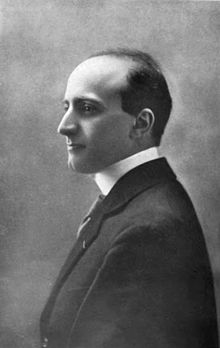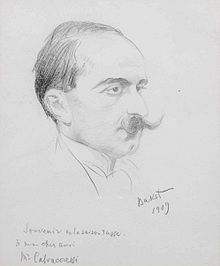Michel-Dimitri Calvocoressi

Michel-Dimitri Calvocoressi(2 October 1877 – 1 February 1944) was a French-bornmusic criticandmusicologistof Greek descent who was a British citizen and resident in England from 1914 onwards.[1]He is especially noted for his writings onRussian classical music,particularly on the life and works ofModest Mussorgsky,and his close association with the French musical establishment.
Born inMarseille,Calvocoressi learned numerous languages in his youth and attempted various careers before settling on music criticism. His early career was spent as an influential music critic in Paris, where he contributed to English and French newspapers:Gil Blas,theComoedia Illustré,The Morning PostandThe Musical Times,among others. He was well acquainted with the city's musical figures, particularlyMaurice Ravel.Alongside Ravel and the pianistRicardo Viñes,Calvocoressi founded theApachesmusical society.
After serving as acryptographerin England for World War I, he remained in London to continue criticism and musicological writing for the rest of his life. Although he wrote his later books in English and came to know English cultural figures such asArnold BennettandRalph Vaughan Williams,his colleagueGerald Abrahamremarked that "he never enjoyed the influence and authority in London that he had exercised in Paris".[2]In addition to his writings on Russian music and Mussorgsky, he wrote on the music ofLiszt,Glinka,Schumann,KoechlinandDebussy.
Early life and education[edit]
Michel-Dimitri Calvocoressi was born inMarseille,France on 2 October 1877 toGreekparents.[3]In his earliest years he learnedGreek,Italian,English and later German; he noted that "I read far more English books than French."[4]At the École Monge high school of Paris, he developed a lifelong interest ingeologyandmineralogy.[4]The musicologistGerald Abrahamnotes that Calvocoressi had "a number of false starts at other careers: law, banking and stockbroking".[4]At first, he studied at theLycée Janson de Sailly,Paris, but inspiration from anOrchestre Lamoureuxconcert ofRichard Wagner's works galvanized his interest in music.[4][a]
Alongside his piano lessons with Eugène Claveau, Calvocoressi frequented the Parisian concert scene, with works byBach,Liszt,d'Indy,Wagner, and theRomanticRussian composers in particular leaving a lasting impression.[4]He began harmony study at theConservatoire de PariswithXavier Leroux,where he became friends with the composerMaurice Ravel;[2]Ravel later dedicated "Alborada del gracioso" from the piano suiteMiroirsto Calvocoressi.[5][b]Ravel also harmonized a set of Greek folk songs which Calvocoressi translated, known asCinq mélodies populaires grecques,and may have inspired the composer's pianoSonatine.[7]Like Ravel, Calvocoressi was a member of theApachesmusic society.[8][c]
Career and later life[edit]

Calvocoressi's music criticism career can be divided into two: a French (1902–1914) and English (1921–1944) period.[12]Described by Abraham as "a remarkable polyglot", Calvocoressi's career beginning in 1902 was as a music critic and correspondent for several English, American, German and Russian periodicals.[2]Encouraged by the novelistBinet-Valmer,the latter introduced him toOctave Maus,an editor of the monthlyL'Art Modernemagazine.[4]Calvocoressi became the Paris musical correspondent forL'Art Moderneand music critic for Binet-Valmer'sLa Renaissance latinemagazine; around then he also was music critic for the Anglo-FrenchWeekly Critical Review.[4]Although some of these publications became obsolete in the next few years, Calvocoressi was well established enough to be unaffected.[13]He contributed to other publications and various time: the dailyGil Blas,the fortnightlyComoedia Illustré(part ofComœdia), the dailyThe Morning Postand particularly monthlyMusical Times.[12]
Calvocoressi published his first book—a study onFranz Liszt—in 1905, the year when he began writing for the EnglishMonthly Musical Record,began both a correspondence with the Russian composerMily Balakirevand developed a general interest in Russian music, particularly the work ofModest Mussorgsky.[12]From 1907 to 1910 he served as an advisor for the impresarioSergei Diaghilev,who organized Russian music and ballet concerts in Paris.[2]For his efforts, the Russian government granted him theOrder of Saint Anna,while the Soviets later elected him a member of theAcademy of Sciences of the Soviet Union.[12]He visited Russia for the first and only time in 1914, meeting with musical figures such asAlexander Glazunov.[12]Calvocoressi lectured at theÉcole des Hautes Études Socialesfrom 1905 to 1914, teaching about contemporary music.[2]He also translated song texts, opera librettos and books from Russian and Hungarian into French and English.[2]His next books included studies on Mussorgsky (1908),Glinka(1911) andSchumann(1912).[2]
Calvocoressi paused music criticism at the onset ofWorld War Iin 1914, but found himself unable to serve the French due to his Greek ancestry.[2]Later that year he moved toLondonand served as acryptographer.[2]He spent the rest of his life in England; he was naturalized and married Ethel Grey, a British citizen who was the dedicatee of many of his future books.[12]These later studies were all in English, and included studies onKoechlin(1923), music criticism (1923), musical taste (1925), recollections of his musical experiences (1933),Debussy(1944) as well on two studies each on Russian music (1936 & 1944) and Mussorgsky specifically (1946 & 1956).[2]Although he continued music criticism in London from 1921 onwards, Abraham remarked that "he never enjoyed the influence and authority in London that he had exercised in Paris".[2]Calvocoressi became well acquainted with "many distinguished Englishmen", including the authorArnold Bennettand the composerRalph Vaughan Williams.[2]He died in London on 1 February 1944.[4]
Selected writings[edit]
Books[edit]
- Calvocoressi, Michel-Dimitri (1905).Franz Liszt: Biographique Critique[Franz Liszt: Critical Biography]. Les Musiciens célèbres (in French). Paris: H. Laurens.OCLC1135190659.
- —— (1908).Moussorgsky.Maîtres de la musique (in French). Paris:F. Alcan.OCLC3797891.
- —— (1911).Glinka.Les Musiciens célèbres (in French). Paris: H. Laurens.OCLC1142939.
- —— (1912).Schumann.Les écrits et la vie anecdotique et pittoresque des grands artistes (in French). Paris: Société des éditions Louis-Michaud.OCLC8641346.
- —— (1923).Charles Koechlin(in French). Paris: M. Senart.OCLC19949660.
- —— (1923).The Principles and Methods of Musical Criticism.London:Oxford University Press.OCLC558073283.
- —— (1925).Musical Taste and How to Form it.London:Oxford University Press.OCLC909990.
- —— (1933).Musicians Gallery: Music and Ballet in Paris and London.London:Faber and Faber.OCLC2535873.
- ——;Abraham, Gerald(1936).Masters of Russian Music.New York:Alfred A. Knopf.OCLC926146.
- —— (1944).Debussy.London:Novello and Company.OCLC1448206.
- —— (1944).A Survey of Russian Music.Harmondsworth:Penguin Books.OCLC558073294.
- —— (1946).Mussorgsky.London:J. M. Dent & Sons.OCLC1559285.
- —— (1956).Mussorgsky: His Life and Works.London: Rockliff.OCLC2048876.
Articles[edit]
- Calvocoressi, Michel-Dimitri (1 December 1913). "Maurice Ravel".The Musical Times.54(850): 785–787.doi:10.2307/907706.JSTOR907706.
- —— (October 1921). "The Practice of Song-Translation".Music & Letters.2(4): 314–322.JSTOR726587.
- —— (January 1941). "When Ravel Composed to Order".Music & Letters.22(1): 54–59.JSTOR727827.
- —— (July 1922). "The Unknown Mussorgsky".Music & Letters.3(3): 237–244.JSTOR726236.
References[edit]
Notes[edit]
- ^Calvocoressi's subject of study at theLycée Janson de Saillyis variously reported in modern sources. The musicologistGerald Abrahamfirst records that he studied philosophy underAndré Lalande,[4]but later says it wasclassicsand that he "entered the law faculty but soon abandoned law".[2]
- ^Ravel laterorchestrated this movementin 1919[6]
- ^Other members were the composersFlorent Schmitt,Maurice DelageandPaul Ladmirault,the poetsLéon-Paul FargueandTristan Klingsorand the painterPaul Sordes[9][10][11]
Citations[edit]
- ^The Concise Oxford Dictionary of Music2013.
- ^abcdefghijklmAbraham 2001.
- ^Jacobs 2002,§ para. 1.
- ^abcdefghiAbraham 1944,p. 83.
- ^Huebner 2011,pp. 20–21.
- ^Kelly 2001.
- ^Abraham 1944,pp. 84–45.
- ^Goubault 1984,p.40.
- ^Pasler 1982,p. 403.
- ^Nichols 1977,p. 20.
- ^Orenstein 1991,p. 28.
- ^abcdefAbraham 1944,p. 84.
- ^Abraham 1944,pp. 83–84.
Sources[edit]
- Books
- Goubault, Christian (1984).La Critique Musical dans la Presse Français de 1870 à 1914(in French). Geneva: Editions Slatkine.ISBN9782051005425.
- Huebner, Steven (2011). "Ravel's Poetics: Literary Currents, Classical Takes". In Kaminsky, Peter (ed.).Unmasking Ravel: New Perspectives on the Music.Rochester:University of Rochester Press.ISBN978-1-58046-337-9.
- Nichols, Roger(1977).Ravel.Master Musicians. London: Dent.ISBN978-0-460-03146-2.
- Orenstein, Arbie (1991) [1975].Ravel: Man and Musician.Mineola: Dover.ISBN978-0-486-26633-6.
- Articles
- Abraham, Gerald(March 1944). "M. D. Calvocoressi (1877-1944)".The Musical Times.85(1213): 83–85.JSTOR921571.
- Abraham, Gerald(2001)."Calvocoressi, Michel-Dimitri".Grove Music Online.Oxford:Oxford University Press.doi:10.1093/gmo/9781561592630.article.04622.ISBN978-1-56159-263-0.(subscription orUK public library membershiprequired)
- Jacobs, Arthur(2002) [1992]."Calvocoressi, Michel-Dimitri (opera)".Grove Music Online.Oxford:Oxford University Press.doi:10.1093/gmo/9781561592630.article.O004935.ISBN978-1-56159-263-0.(subscription orUK public library membershiprequired)
- Kelly, Barbara L.(2001)."Ravel, (Joseph) Maurice".Grove Music Online.Oxford:Oxford University Press.doi:10.1093/gmo/9781561592630.article.52145.(subscription orUK public library membershiprequired)
- Kennedy, Michal;Kennedy, Joyce Bourne, eds. (2013) [2007]."Michel-Dimitri Calvocoressi".The Concise Oxford Dictionary of Music.Oxford:Oxford University Press.ISBN978-0-19-920383-3.
- Pasler, Jann (June 1982). "Stravinsky and the Apaches".The Musical Times.123(1672): 403–407.doi:10.2307/964115.JSTOR964115.
Further reading[edit]
- Gombocz, Adrienne;Somfai, László(1982). "Bartóks Briefe an Calvocoressi (1914-1930)".Studia Musicologica Academiae Scientiarum Hungaricae(in Hungarian). T. 24 (Fasc. 1/2): 199–231.doi:10.2307/901829.JSTOR901829.
- Maine, Basil(March 1926). "Personalities among Musical Critics. II. M. -D. Calvocoressi".The Musical Times.67(997): 216–217.doi:10.2307/912506.JSTOR912506.
- Maine, Basil(1928).Behold These Daniels: Being Studies of Contemporary Music Critics.London: H. & W. Brown. pp. 8–14.OCLC2763914.
External links[edit]
- Articlesby Calvocoressi onJSTOR
- The Michel-Dmitri Calvocoressi Manuscripts– Special Collections at theUniversity of Maryland
- Michel-Dimitri Calvocoressidiscography atDiscogs
